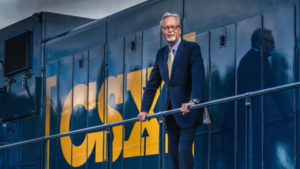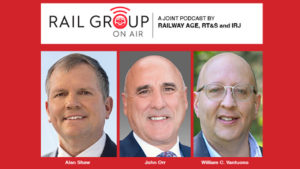Grant sought to help Fort Worth railroads out of a jam
Written by jroodThe so-called Tower 55 crossing in downtown Fort Worth, Texas, needs additional tracks so not every train moving through the crowded freight intersection has to stop and wait for another, state and local officials said Wednesday during a tour of the crossing, The Dallas Morning News reports.
The request for federal
funds is part of a nationwide scramble for dwindling piles of cash designed to
speed infrastructure projects as a means to stimulate the stagnant U.S.
economy. The so-called TIGER II grants are due July 26 and will be awarded in
the fall.
The $600 million set
aside for the grants is a tiny sliver compared with the larger stimulus program
approved early last year, though cash-strapped states and cities are expected
to compete fiercely for the money.
"This is one of the
busiest pieces of railroad in the entire United States," said BNSF Chief Executive
Matt Rose, who acknowledged that competition for the grants will be fierce.
"Every city, state,
transit authority and railroad is going to submit an application," he
said. "And there is a lot of art involved in how these funds are
awarded."
Bill Meadows, the Texas
Transportation Commission member who helped corral the local and state teams to
support the grant, said he initially had questions about why scarce tax dollars
should help fund a private railroad improvement. After all, his own department
has frequently warned Texans that it doesn’t have enough money to properly
maintain its highways, even as transit agencies in Dallas and Fort Worth are
cutting service or delaying important projects.
"I’ve asked tough
questions about this, about why the [private rail] companies can’t just spend
the money themselves," Meadows said. "I’ve jumped into the details,
and I’m satisfied it’s a good project for Texas."
BNSF’s Rose said that
Tower 55 is among the three busiest freight rail crossings in the country and
that improvements there would make commercial shipping more efficient in Texas
and much of the country. They also eventually could make it easier for
railroads like his to share their lines with intercity passenger rail, he said.
Though the recession has brought
a sharp decline in freight traffic everywhere in the United States, the Tower
55 crossing still serves about 100 freight trains – some 8,000 feet long – a
day. The improvements would allow about 140 trains to smoothly pass through
downtown and would reduce the number of trains that routinely wait 30 minutes
or more to pass.
The work would cost $94
million and could be completed 18 months after it begins if Texas gets the
grant. Union Pacific, which has major operations at its Dallas rail
yard, and Fort Worth-based BNSF would contribute about $31 million toward the
project. Fort Worth’s transit agency would add $2.5 million.
On July 7, Rep. Michael Burgess,
R-Lewisville, said that
he would support the application in Washington and that the state’s decision to
make it its top priority would carry weight with the Obama administration.
Even if fixing Tower 55
would have only a small impact on passenger rail – and wouldn’t affect the
Trinity Railway Express service at all, drivers in Texas would benefit, he
said. Every train that carries freight through Fort Worth means potentially
scores, or even hundreds, of trucks that wouldn’t be on Texas highways. And
moving trains through the crossing faster would block fewer street
intersections in Fort Worth, cleaning the city’s air.
Clint Schelbitzki, a
regional spokesman for Union Pacific, noted that UP’s rail yard in Dallas
unloads 300,000 trucks of cargo a year as part of its multimodal freight
operations. Each of those freight cartons, most of which originated in Asia, is
loaded on a train that passes through Tower 55 before heading east, he said.
Rollin Bredenberg, a vice
president at BNSF, said that if Texas doesn’t get the grant, Tower 55 would
eventually be fixed anyway – at the rail companies’ expense. But the wait might
be years, if not decades, he said, as the companies probably would wait until
the delays were so bad that they couldn’t afford not to fix the crossing.





